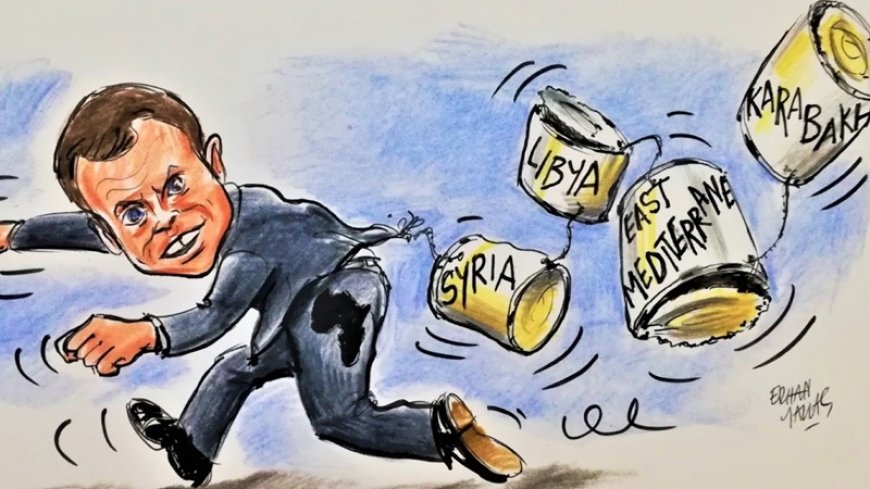The Declining Influence of France: An Interpretive Study of Western Political Dynamics
Once seen as a foundation of world diplomacy and power, France is today struggling with a dramatic loss of global importance. France has had a privileged position in world affairs historically acknowledged for its colonial past, seat as a permanent member of the United Nations Security Council, and central involvement in the European Union and NATO. But the political and diplomatic weight of the country has dropped significantly in recent years, revealing weaknesses in both its foreign and home policy.

Once seen as a foundation of world diplomacy and power, France is today struggling with a dramatic loss of global importance. France has had a privileged position in world affairs historically acknowledged for its colonial past, seat as a permanent member of the United Nations Security Council, and central involvement in the European Union and NATO. But the political and diplomatic weight of the country has dropped significantly in recent years, revealing weaknesses in both its foreign and home policy.
Under President Emmanuel Macron's direction, France has been confronted increasingly difficult problems that have degraded its political reputation. Domestic turmoil has been exacerbated by Macron's presidency, which is characterized by public discontent, economic disparity, and a growing alienation with the voters. The "Yellow Vest" demonstrations and strikes against pension changes are typical of the general discontent with his government's alleged neglect of the lower-income levels of society. This discontent has given opposition groups more confidence; leaders like Marine Le Pen have become rather popular and changed the political scene of France.
Many people doubt Macron's leadership because of his political wriggling, marked by a change between leftist supporters and conservative pragmatism. Underlining a presidency in survival mode rather than one guiding a coherent vision for the country is the collaboration with Michel Barnier's moderate-conservative fraction and compromises on immigration policy to placate Le Pen's followers. Critics contend that although Macron's political calculations are meant to be short-term stabilizing, they have fostered popular mistrust and expanded the ideological divide in French society.
Comparisons to the 1969 resignation of Charles de Gaulle are becoming rather common among experts. De Gaulle resigned, recognizing his declining mandate even though he was experiencing fewer severe political setbacks. Given the more volatile political environment Macron finds himself in, he could be wise to follow a like line of action. Steering away may let France adjust its political course as approval ratings drop and the 2027 presidential contest seems a far-off, uphill struggle.
The declining impact of France is not limited to its borders. The nation's incapacity to impose itself as a major actor in regional and international issues points to a more general decline of its diplomatic might. Leading French publication Le Figaro lately bemoaned France's declining influence, pointing out its inability to act as a stabilizing agent in crises such as those in Syria and Lebanon. French-backed leaders like Samir Geagea have found difficulty in Lebanon; many view them as Western interests' spokesmen rather than actual supporters of Lebanese ambitions.
In Africa, where France used to be somewhat powerful, the narrative is equally sad. With anti-French attitudes running across the continent, Paris's attempts to keep influence in former colonies including Chad, Mali, and Algeria have mainly backfired. Military coups in Francophone Africa have highlighted France's incapacity to fit the changing political environment of the continent, therefore leaving a void progressively occupied by non-Western powers like Russia and China.
France's fall fits more general difficulties the European Union faces. France and Germany have become the twin motors of the EU after Brexit. But both countries have been stretched by economic stagnation brought on by the expenses of backing Ukraine against Russian aggression. Rising fiscal deficits and internal strife have hampered their capacity for leadership, therefore putting the EU in a vulnerable state.
The emergence of populist and extreme movements in France is not a singular occurrence but rather a larger European tendency. Radical alternatives have found a path thanks to financial uncertainty and public unhappiness about supposed elitism and poor government. This is the breakdown of established political parties, a phenomena altering European politics, which the Quincy Institute rightly called.
France's problems also mirror a larger malaise afflicting Western democracies. Symptoms of a Western system in collapse include reliance on antiquated colonial policies, incapacity to solve home disparities, and failure to change with regard to rising global powers. Once a beacon of Enlightenment ideas and revolutionary enthusiasm, France now runs the danger of serving as a warning about complacency and excess.
The West has to face these obstacles squarely if it is to recover importance. Particularly France has to rethink its place in the world: not as a relic of its colonial history but as a forward-looking country able to solve modern problems with pragmatism and inclusiveness. Without such a change, the nation runs the danger of being more isolated in a world going more multipolar.













































